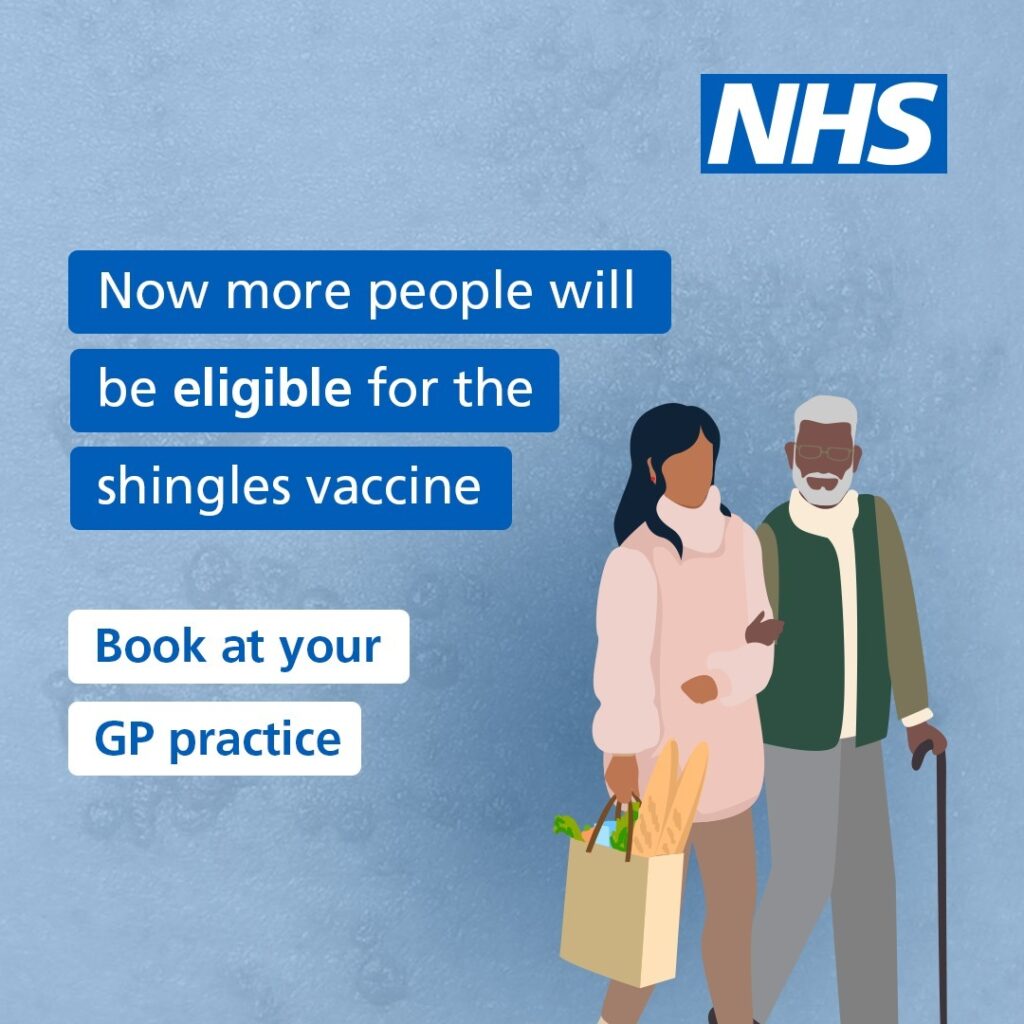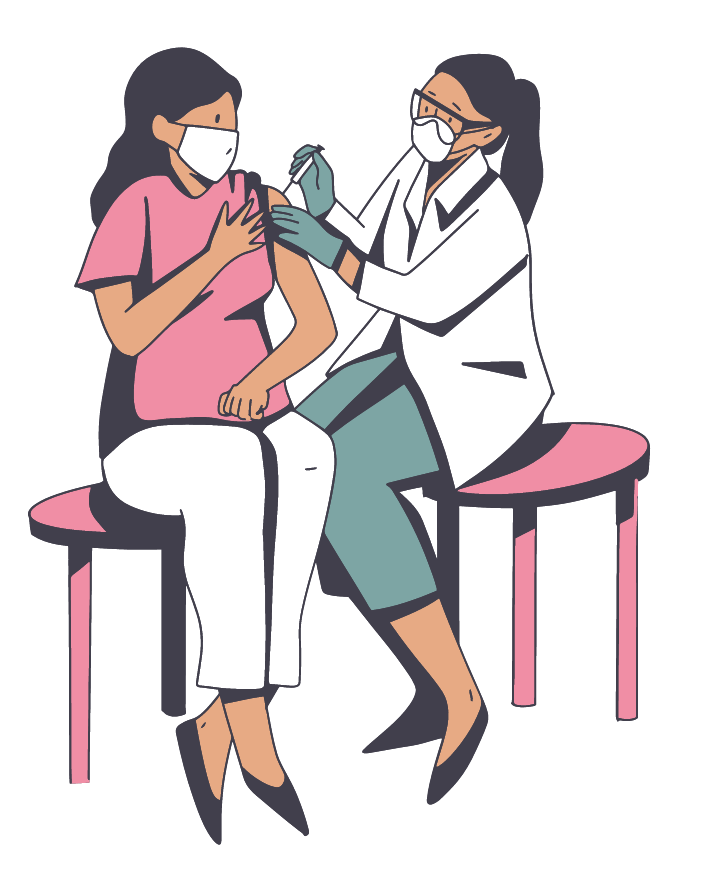
Immunocompromised people aged 50+ are now eligible for the shingles vaccine
 September 12th, 2023
September 12th, 2023 Debbie Kinsey
Debbie Kinsey Latest News
Latest News 0 Comments
0 Comments
 From 1st September 2023, anyone aged 50 or over who is immunocompromised can receive the shingles vaccine.
From 1st September 2023, anyone aged 50 or over who is immunocompromised can receive the shingles vaccine.
If you are not immunocompromised, you can receive the vaccine if you are aged 70-79, or if you turn 65 on or after 1st September 2023.
You can read the announcement on the NHS England website in full here (the same criteria also apply in other areas of the UK).
And read the answers to some frequently asked questions below. If you are unsure if you are eligible for the vaccine then speak to your doctor.
FAQs – click on any of the below to be taken to the relevant section
- What is shingles?
- Why should I get the shingles vaccine?
- Who can have the shingles vaccine?
- How do I get the vaccine? When will I be invited?
- What vaccine is used and how is it given?
- Can I have the shingles vaccine at the same time as other vaccines?
- Who should not have the shingles vaccine?
- If I haven’t had chickenpox, should I get the shingles vaccine?
- Can I have the vaccine if I have already had shingles?
- Will I need a booster dose?
- Why can’t younger people get the shingles vaccine?
- Why can’t people aged over 80 get the vaccine if they don’t have a weakened immune system?
What is shingles?
Shingles is a disease which affects your nerves and skin, causing mild to severe pain, an itchy rash with blisters, and sometimes other symptoms such as tingling, headaches, and a high temperature. Symptoms usually improve in 2-4 weeks. However, shingles can cause serious complications, which are more likely in people who are elderly or immunocompromised. Complications include eye problems, hearing loss, and lasting pain the area shingles affected (called “postherpetic neuralgia” or PHN. There is no cure for shingles, and treatment is usually designed to help with symptoms, such as pain relief. Shingles mainly affects people who are over 50 years old.
Why should I get the shingles vaccine?
The vaccine reduces your chances of getting shingles and the complications of shingles. If you still get shingles after having the vaccine, the symptoms will be reduced.
Who can have the shingles vaccine?
From 1st September 2023, you can get the shingles vaccine if you are:
- Aged 50+ and have a weakened immune system (immunocompromised)
- Aged 70-79
- If you turn 65 on or after 1st September 2023
If you are not sure if you are the right age, you can use NHS Scotland’s calculator for age eligibility here.
For this vaccine, the definition of “immunocompromised” includes:
- People on immunosuppressive or immunomodulating therapy including:
Those who are receiving (or have received in the last 3 months) targeted therapy for autoimmune disease, such as JAK inhibitors or biologics such as B-cell targeted therapies (including rituximab for which there is a longer period of the past 6 months).
Those who are receiving, or have received in the past 6 months, immunosuppressive chemotherapy or radiotherapy.
Those who are receiving, or have received in the past 6 months, immunosuppressive therapy for a solid organ transplant.
- People with chronic immune mediated inflammatory disease who are receiving, or who have received, immunosuppressive therapy, including:
Moderate to high dose corticosteroids (equivalent to 20mg+ prednisolone per day) for more than 10 days in the past month.
Long-term moderate does corticosteroids (equivalent to 10mg+ prednisolone per day for more than 4 weeks) in the past 3 months.
Any non-biological oral immune modulating drugs in the past 3 months. Eligible doses include more than 20mg of methotrexate per week, more than 3mg/kg/day of azathioprine, more than 1.5mg/kg/day of 6-mercaptopurine, more than 1g/day of mycophenolate.
- Certain combination therapies at individual doses lower than stated above, including those on more than 7.5g of prednisolone per day in combination with other immunosuppressants (other than hydroxychloroquine or sulfasalazine), and those receiving methotrexate (any dose) with leflunomide.
- People who have been on a short course of high dose steroids (equivalent to more than 40g of prednisolone per day for more than a week) in the past month.
- People with primary or acquired immunodeficiency states due to conditions including acute and chronic leukaemias and functional lymphocyte disorder.
You can read the full list of people who are eligible on page 7 of the vaccine green book.
How do I get the vaccine? When will I be invited?
You should be invited by your GP practice if you are eligible. If you don’t receive an invitation but think you are eligible, you can contact your GP.

What vaccine is used and how is it given?
There are currently two vaccines used – Shingrix and Zostavax. The vaccine used will depend on your age and immune status. Both provide effective protection, but Zostavax is being discontinued so only Shingrix will be used in the future.
Can I have the shingles vaccine at the same time as other vaccines?
Speak to your doctor about what would be best for you. You can have the shingles vaccine at the same time as the pneumococcal vaccine (PPV), COVID-19 vaccines, and inactivated flu vaccines. Ideally, there should be a 7-day gap between getting the shingles and the aQIV flu vaccine, which is licensed for use in the over 65s.
Who should not have the shingles vaccine?
You should not have the vaccine if you have had a severe reaction to any of the vaccine’s ingredients. You can see the full list of ingredients in the Shingrix patient information leaflet and the Zostavax patient information leaflet. Speak to your doctor if you’re not sure if you should have the shingles vaccine.

If I haven’t had chickenpox, should I get the shingles vaccine?
Yes. Some people have had chickenpox without realising because they didn’t have rash.
Can I have the vaccine if I have already had shingles?
Yes, but you should talk to your GP to see how long you should wait before having the vaccine to make sure you are fully recovered. The vaccine may help to boost your immunity against further shingles attacks.
Will I need a booster dose?
There is currently no booster dose of the shingles vaccine. After having two doses of Shingrix or one dose of Zostavax you are considered to be protected against shingles.



 ©2024 LUPUS UK (Registered charity no. 1200671)
©2024 LUPUS UK (Registered charity no. 1200671)